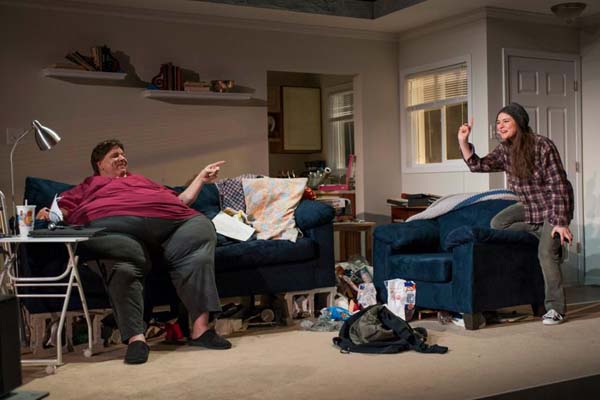
photo: Michael Brosilow
Dale Calandra and Leah Karpel in The Whale.
When the lights go up on The Whale, playwright Samuel D. Hunter confronts his audience with an image that is undeniably repulsive. A 600-pound man is sitting—beached is the word that comes to mind—on his sofa, his girth defining him not as a person but as a disgusting oddity.
Yet from that shocking opening tableau, Hunter proceeds to accomplish what at first seems impossible: He makes the monstrously heavy Charlie into a fully realized, deeply relatable protagonist. By the emotionally wrenching close of The Whale, the behemoth on stage is no longer a repulsive freak—he is Everyman and you are rooting for him.
Directed by Joanie Schultz, The Whale is an unflinching examination of the concept of “other,” whether that otherness is defined by physical appearance, religious beliefs, sexuality or extreme cruelty. Charlie is the most painfully blatant example of other in the piece, an undeniably obvious depiction of someone who exists well outside society’s parameters of what constitutes acceptable. At first glance, he’s no more (and no less) than the embodiment of grotesque gluttony, a something rather than a someone, defined not by humanity but by a gross lack of self control. Charlie may be human, but he is also a selfish waste of a human being. That sounds harsh, but The Whale is designed to evoke extreme reactions, and so it does.
Yet as the 90-minute piece continues, Hunter forces the audience to confront its initial, inescapable judgments. Charlie’s obesity is simply the most visual example of otherness in The Whale. His daughter Ellie might look normal, but her relentless malice toward everyone she encounters marks her as someone as profoundly damaged as her father. Evangelizing Mormon missionary Elder Thomas (Will Alan) might be able proselytize with the fresh-faced ardor of a true believer, but he too is a misfit struggling mightily to find his place in the world. Ditto Charlie’s long-time friend Liz, a co-dependent care-taker who is all too quick to turn up the television whenever real life becomes too painful.
The Whale is provocative and uncomfortable, a drama anchored in realism yet embedded with the heightened language of poetry. Set entirely in the squalor of Charlie’s living room—set designer Chelsea Warren has the stage so littered with empty chicken buckets and crumpled candy bar wrappers that you can practically feel the fetid stickiness of the place—The Whale becomes a story that transcends the tragic, largely self-imposed prison that Charlie has built for himself.
Within that prison, Charlie has fashioned one small, essential escape hatch. An online English instructor, his small, gleaming window to a larger world comes from the student essays he grades. Within (hilariously) poorly written papers on the likes of Moby Dick, Charlie finds a link to a haven beyond his endless supply of junk food and trash TV, literally clinging to his students’ essays like a drowning man grasping a life raft.
Schultz’s terrific ensemble cast creates characters that elicit compassion even at their most off-putting. As Charlie, Dale Calandra (wrapped in a dismayingly realistic body suits designed by Janice Pytel) is a heart-breaker, a man whose despair comes with a keen edge of mordant wit and a profound sorrow. Leah Karpel’s Ellie is a bratty terror, who transforms into a portrait of vulnerability once her iron-clad defenses are finally breached. And as Liz, Cheryl Graeff aptly depicts a broken-hearted woman who finds solace in destructive generosity. Finally, there’s Patricia Kane as Charlie’s ex-wife. Her shock and overwhelmed dismay at seeing what’s become of her one-time husband is palpable.
With its frank gaze at addiction, dysfunction and tragedy, The Whale is definitely not destined to be the feel-good hit of the spring. But it scalds in its examination of lost outsiders struggling to find a way out of exile.
Through May 5 at the Victory Gardens Biograph Theater, 2433 N. Lincoln, 773/871-3000, $30 to $60.


